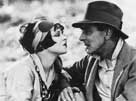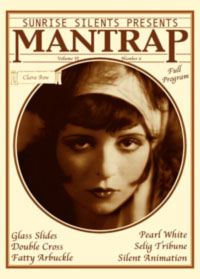FILM NOTES
FILM NOTES INDEX
NYS WRITERS INSTITUTE
HOME PAGE

Directed by Victor Fleming
(United States, 1926, 86 minutes, b&w, 35mm)
Silent with live piano accompaniment by Mike Schiffer
Starring:
Clara Bow . . . . . . . . . . Alverna
Ernest Torrence . . . . . . . . . . Joe Easter
Percy Marmont . . . . . . . . . . Ralph Prescott
The
following film notes were prepared for the New York State Writers
Institute by Kevin Jack Hagopian, Senior Lecturer in Media Studies
at Pennsylvania State University:
Clara Bow… Her very name is an emblem of American culture in the 1920's, the first name archaic, the second short, smooth, and sleek. The decade itself was like that, a collision of what had been with what was yet to be, as the countryside met the city, the horse met the auto, and the citizen met the consumer. The nation's movie screens were offering lessons in modern life, and Clara Bow was modernity's pin-up. Smart, stylish, and endlessly sexy, Clara Bow's heyday as a flapper star corresponded exactly to the Great Bull Market of the late 1920's.
Clara Bow had grown up amid poverty and abuse and Brooklyn. But after a Coney Island beauty contest landed her a small role in 1922's Down to the Sea in Ships, she remade herself as a carefree, adorable, spunky screen character who captured the twenties in cinematic amber. Bow's flapper was the movies' great contribution to the 1920's ideal of the New Woman, effervescent, hoydenish, and ingenious, reinventing herself and improvising her way through one romantic challenge after another a delightfully self-determined character. Yet the movies couldn't shake their debt to conventional ideologies of gender; in few of the flapper movies does hedonism ever lapse into licentiousness, and there are dutiful lessons about family and marriage to be learned in the last reel. Nonetheless, whether as a shop girl or an heiress, in films like The Plastic Age, Get Your Man, Free to Love, and My Lady of Whims, and penultimately, It, Clara Bow offered an image of liberation to women, and intelligent, vibrant sexuality to everyone..
Clara Bow was not the only flapper heroine. There were Colleen Moore, Louise Brooks, and a young Joan Crawford, and a dozen more. In films with titles like Rolled Stockings, Love `Em and Leave `Em, and Our Dancing Daughters, the flapper heroines followed Bow's example of a distinctively modern character. Their brisk, economical acting and modern mores supplanted the palmier, Victorian styles associated with the great D. W. Griffith heroines of the 1920's, Mae Marsh, Blanche Sweet, and the Gish sisters.
 Mantrap is one of Bow's most characteristic films, a romantic drama that showcases Bow's comic skills, and surprising emotional power in a winning persona. The film started life as a Sinclair Lewis novel which appeared at the end of one of the most remarkable runs in American literature; Lewis had published Main Street, Babbitt, and Arrowsmith in the previous three years. Mantrap appeared in the year Lewis won the Pulitzer Prize for Arrowsmith - and then scandalously refused it. In 1926, Sinclair was news, as was any film made from one of his notorious novels. Mantrap is the story of a cynical divorce lawyer, who goes on a backcountry trip to forget the philandering husbands and chiseling wives who have made him rich. While there, he meets Alverna, once a manicurist in the city, and now stranded in a woodsy Siberia. She is beautiful, coquettish, irresistible, but she is also another man's wife; should he rescue her, and get himself into one of the tabloid divorce cases that have made him his fortune, or leave her in the wilderness? Emptied of most Lewisian social comment, Mantrap is no more substantial in story outline than any of a dozen Bow vehicles. But in the capable hands of director Victor Fleming, who directed some of her best films (and with whom Bow had one of her many romances), and cinematographer James Wong Howe, Mantrap is a film of great blitheness and appeal.
Mantrap is one of Bow's most characteristic films, a romantic drama that showcases Bow's comic skills, and surprising emotional power in a winning persona. The film started life as a Sinclair Lewis novel which appeared at the end of one of the most remarkable runs in American literature; Lewis had published Main Street, Babbitt, and Arrowsmith in the previous three years. Mantrap appeared in the year Lewis won the Pulitzer Prize for Arrowsmith - and then scandalously refused it. In 1926, Sinclair was news, as was any film made from one of his notorious novels. Mantrap is the story of a cynical divorce lawyer, who goes on a backcountry trip to forget the philandering husbands and chiseling wives who have made him rich. While there, he meets Alverna, once a manicurist in the city, and now stranded in a woodsy Siberia. She is beautiful, coquettish, irresistible, but she is also another man's wife; should he rescue her, and get himself into one of the tabloid divorce cases that have made him his fortune, or leave her in the wilderness? Emptied of most Lewisian social comment, Mantrap is no more substantial in story outline than any of a dozen Bow vehicles. But in the capable hands of director Victor Fleming, who directed some of her best films (and with whom Bow had one of her many romances), and cinematographer James Wong Howe, Mantrap is a film of great blitheness and appeal.
By the Depression-ravaged 1930's, Clara Bow suddenly seemed hopelessly out of date. Although she was growing as an actor (1932's Call Her Savage, her next to last film, is one of her strongest performances), she was passe; a new generation of performers, seemingly reared before the microphone, took her spotlight, but Barbara Stanwyck, Irene Dunne, and especially Carole Lombard and Jean Harlow all borrowed, consciously or not, some of Bow's range and sympathy, her sexuality and good humor. When she died, alone and lonely in 1965, Bow was a souvenir of another epoch. Her legacy remained largely taken for granted, until David Stenn's wonderful biography, Runnin' Wild, was published in 1988, and the documentary Clara Bow: Discovering the It Girl, appeared in 1999. Most important, Bow's films have started to become widely available on DVD, and they show a distinctively modern performer, a woman of energy and zest.
— Kevin Hagopian, Penn State University
For additional information, contact the Writers Institute at 518-442-5620 or online at https://www.albany.edu/writers-inst.
 Man Trap
Man Trap